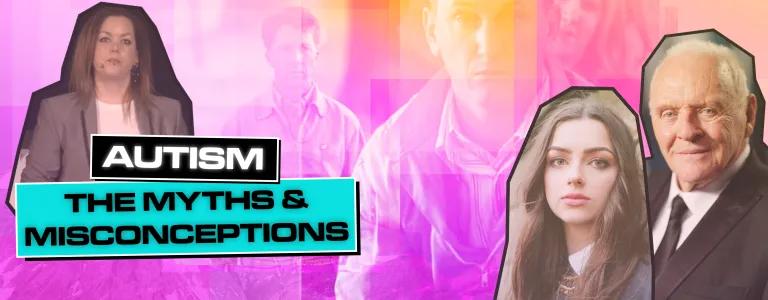
Autism: The Myths And Misconceptions
By Adrian (he/him) who, as a member of the neurodivergent community, is inspired by how others are celebrating their differences to drive positive change.
When you hear the word ‘autism’, do you automatically think “kooky genius” or “oh that only affects men”? If so, this one’s for you.
As a society, there’s a lot of myths and misconceptions about autism, all driven by outdated stereotypes and incorrect assumptions. Fact is, autism doesn’t only affect men. And autistic people aren’t all geniuses. Those are just some of the myths that need busting!
And there’s no better place to start than hearing directly from autistic people about their real-life experience. As part of the #NowIKnow campaign, here’s Alex who shared about being diagnosed with autism:
And Jac den Houting gave a brilliant TED talk on ‘Why everything you know about autism is wrong’, which is an enlightening watch:
You’ll probably agree that both Alex and Jac are far from the stereotypes of Dustin Hoffman in Rain Man, or Sean Penn in I am Sam! Thankfully in recent years there’s been a growing movement of autistic people speaking out about their experience, including people in the public eye like the actor Anthony Hopkins, director Paddy Considine, and TV presenter Melanie Sykes. With an estimated one million people in the UK being autistic, it’s about time we remove the stigma and bust the myths. On which note…
Myth: Autism can be cured
Truth: Autism means the person’s brain works differently to that of a neurotypical person. And that isn’t something which can be cured. Which is totally okay. Being ‘different’ to neurotypical people doesn’t mean ‘worse’, or ‘better’. It’s simply different. While autistic people can find life challenging, there’s a growing shift in society to view autism as simply a different way of communicating, thinking, and interacting — which definitely isn’t something that needs to be ‘cured’.
Myth: Autism is a childhood condition
Truth: While it might be true that autistic people with very distinct symptoms of autism are more likely to be diagnosed in childhood, many people don’t receive a diagnosis until they’re adults. So autism isn’t a ‘childhood condition’, and nor is it something that people can ‘grow out of’. Instead, finding the right support, and learning about one’s own triggers means autistic people can put things in place to make life a bit easier. One example of this might be that, if an autistic person finds crowds and bright lights difficult, they might prefer to do their weekly shop at a quiet outdoor market rather than a busy supermarket.
Myth: Autistic people have a special talent
Truth: Every single person on the planet has their own strengths and weaknesses, and autistic people are no different. While research shows that around 28% of autistic people do have special talents, being autistic doesn't necessarily make you the next Einstein! However, many autistic people do really enjoy being intensely focused on a certain topic. Greta Thunberg, and her interest in protecting the environment, is a classic example of this. For many autistic people, being able to focus on their particular interest brings them a lot of pleasure and is fundamental to their wellbeing and happiness.
Myth: Autistic people have learning difficulties
Truth: Many autistic people do well at school, have great careers, and are good communicators. Research shows that around 1 in 4 autistic people speak few or no words, but they can find other ways to communicate. Autistic people may take longer to process information, but that doesn’t mean they don't understand it.
Myth: Autistic people are anti-social
Truth: While it’s true that many autistic people may need support with social skills, most will enjoy having relationships. Some autistic people might be quiet, shy, and feel anxious during social interactions. Others might speak too much and struggle to have two-way conversations. Also, body language, tone of voice, and sarcasm can often be difficult for autistic people to understand, which can make it challenging to make friends or build relationships at work. But having the right support, and a little understanding and empathy from others, can often make all the difference.
Myth: Only boys are autistic
Truth: Autism does appear to be more common in boys, but that might be because girls are more likely to learn to 'mask' their autism by successfully managing to navigate the world. This can mean that many autistic girls get a diagnosis much later in life than boys.
Myth: Autism is caused by bad parenting
Truth: Autism is not caused by bad parenting. However, good parenting — being empathetic, understanding, and supportive — can often help an autistic child to better cope with the world, understand their triggers, and find the support and resources that they need.
Myth: Autism is becoming an epidemic
Truth: Many people think that autism is becoming more and more common to the point where it can be considered ‘an epidemic’. The number of people being diagnosed with autism has increased over the last two or three decades, but this is likely just a consequence of greater awareness and understanding about autism — which means that people who previously wouldn’t have been identified as autistic are now being diagnosed.
If you think yourself or a friend might be autistic, it’s a good idea to talk to your GP as they’ll be able to help you on the path to getting greater support. If there’s one thing to take away from this — whether you’re autistic or not — it’s simply to celebrate your own differences, and respect them in other people. Because in the right environments, and with the right support, all of us can learn to thrive as the individual that we are.





